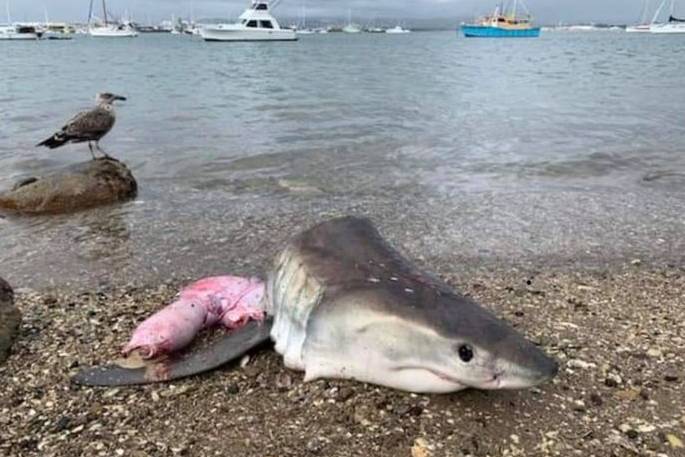Conservationists are 'saddened” by what they suggest appears to be the taking of meat from a great white shark in Tauranga.
The head and remaining dismembered carcass of a juvenile white pointer has been discovered at Pilot Bay over the weekend.
The White Shark Conservation Trust is hoping to find information on how the shark came to be in the location with the lacerations in question.
'We are extremely saddened by this incident,” says Bruce Goorney, trustee with White Shark Conservation Trust.
'We urge anyone who has information about this shark being caught or cut up, to contact DOC or MPI with all urgency.”
The incident, while rare, has left the DOC disappointed and they are now investigating.
'Every year about 12 dead or dying great white sharks show up on New Zealand shores, but the Tauranga shark is the first one for a while that appears to have been taken for food,” says Clinton Duffy, Department of Conservation marine technical advisor.
'The Department of Conservation is saddened by this act which is being investigated and anyone with information is urged to get in touch.”
Mel Kellett, a postgraduate student at the University of Waikato, has been studying sharks for four years.
Unfortunately, she is of the belief the shark has indeed been taken for meat. She also states those involved may not have been aware of the breed of shark.
'The shark had a number of stab wounds into the head, and had been trunked with just the head, pectoral fins, stomach, and intestines being left behind,” she explains.
'This suggests the shark had been deliberately killed and the rest of the body taken for its meat.
'The shark was a juvenile estimated to be around 1.8 – 2m total length. It is possible that the person responsible did not recognise the shark as a white shark.
'Further details are required to understand the circumstances around the incident.”
Whilst there have been increased sightings of great white sharks in Bay of Plenty waters in recent months, the DOC is keen to remind the public they remain relatively rare.
'Great white sharks are quite rare with a population of about 12,000 that move back and forth between New Zealand and the east coast of Australia,” Clinton explains.
'The population is considered stable or slightly decreasing while, globally, white sharks are considered vulnerable.”
The species' status as vulnerable means they are protected and deliberate hunting, killing or harming carries potentially severe penalties, with fines up to $250,000 and two years in jail at the upper end of the punishment scale.
'The great white shark is a protected species under the Wildlife Act. It is illegal to hunt, kill or harm great white sharks,” says Clinton.
'It is illegal to deliberately catch one of the sharks, but not illegal to accidentally catch one. It must be released alive and unharmed.
'It is illegal to retain any part of a great white shark, even if it is dead,” Clinton affirms.
Mel is hopeful this incident can be now be used as a learning experience for what to do in case of an accidental catch of a shark like the one found on Pilot Bay.
'A huge part of protecting species and ecosystems is education,” she says.
'The rules around fishing, catch limits, and the retention of body parts varies depending on the species of interest. In this case, the white shark is a protected species under the New Zealand Wildlife Act and Fisheries Act.
'If you are ever unsure about a species you catch, the safest action is to put it back. It is not illegal to accidently catch a white shark as long as it is released alive and unharmed and reported to the DOC.
'If the shark is already dead on retrieval, it should be reported to DOC immediately as the carcass could be used for research.”
Sighting, captures or strandings can be reported to DOC [email protected] or to 0800 DOC HOT (0800 362 468).



1 comment
to good use
Posted on 11-05-2021 10:38 | By hapukafin
like the turtle Te Papa paid $12000 of tax payers money to send it for burial,DOC should have intervened and used it for research to find out what it may have died from.
Leave a Comment
You must be logged in to make a comment.